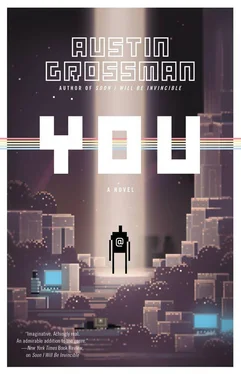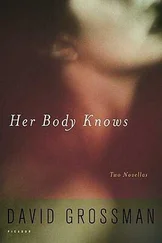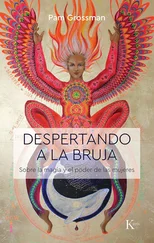Sword fighting has its yomi. There is a thing fencers call the tactical wheel—the strategic laws that decree that each attack has its own specific countermove, the way scissors beats paper, paper beats rock, rock beats scissors. Our combat system was no different, it just came with a great many more options and more ways to predict the outcome. Strong cuts committed a fighter’s weight forward; countermoves took advantage. Certain maneuvers had to be set up by a specific prerequisite move. Some attacks required a recovery phase, leaving the combatant tragically vulnerable. Every choice set up the next set of possibilities on both sides. It was a complex decision tree that both fighters were constantly trying to think their way down, down to the place where their opponent didn’t have a winning option.
Adric—I couldn’t guess how—fought as if he knew his advantage. I gave him false openings and he didn’t move. He fought as if he knew he was fighting a coward. He feinted and jabbed and played with me as I backed up, practically chasing me around the square. I really did look like a coward. I very possibly was a coward.
“Don’t forget, if he can’t recharge he’s going to die,” said Matt. I tried waiting for Mournblade to drain him, but he smoothly decapitated a passing dwarf. It flashed white, which meant another soul gone to power Mournblade’s wielder, who was now back at full strength. He could do that forever.
Lisa said, “Just kill everybody in the city and then he can’t recharge.”
“Isn’t that a little counterproductive?” I said. “Plus, Brennan can’t fight indefinitely. Not since we added the fatigue model.” And Brennan was already getting tired, fighting two-handed now. I was getting a little tired, too. “And stop helping me,” I added.
Brennan started to do his “I am very fatigued” animations. He panted; he staggered when blocked. I tried to rest him by getting out of range; when I did, he’d lower his sword and let the point drag on the ground.
Meanwhile, I was trying to yomi Simon’s own AI, even though everyone knew Simon was smarter than I was and had always been smarter than I was. I could feel—with an inner certainty—that everyone wanted me to give somebody else the controls. Darren, a world-class player who would already have taken Adric’s head off. Matt, who knew the system and the entire world better than I did. Lisa, who understood what was happening and why, and whose nerve wasn’t going to break.
But I knew that Adric would live forever, a walking curse on the world. That was his story. He was a loner, an outcast, an eternal, pretentiously sad fantasy douche bag. Simon had already written his story for him and given him the AI and the devastating magic sword to make it happen. There had to be a way out of that story. That’s why we had video games, which were an enormous amount of trouble to make. So you could do that.
I wasn’t going to win inside the tactical wheel. Screw the tactical wheel. Endorian Anomaly enabled all the game functions, all that code kicking around. I could probably play golf in there if I wanted to, not that that seemed productive. I backed up and watched Adric advance to keep me in range.
Then I turned and ran, sheathing my sword as I went. Probably people were yelling at me, but I didn’t listen. Why should I? The sun had almost set, turning the puddles gold and orange and purple. It seemed just right, the last moments of a warm evening before it gets chilly and you think of going home. It was, in fact, an excellent moment to shred.
Yes, my board had no back wheels, but not all the moves needed them. In point of fact, the lack of back wheels just made me more hard-core. I reached the fountain and tried a little minigrind, balancing on the board as it slid along the rim. It worked just fine. In fact, the camera even knew to run a 180-degree pan to show off the move—which, incidentally, revealed that Adric was closing in, runesword ready to strike. Brennan landed and transitioned, prepping the move I had in mind. It was one of those moments when you’re good enough to forget there’s even a controller. I got into the handplant, feet up, one hand on the rim, and the point of view revolved around me to catch the setting sun, a beautifully thoughtful piece of programming. I triggered the second stage, and Brendan whipped his sword out with his free hand. As he came down, he swept it in a showy circle. It even did the sound effect, a surf-guitar sting and a deep-voiced, heavy-reverb roar as the true king struck home.
ENDORIAN ANOMALY:
GAME MASTER’S SUPPLEMENT
1) If Adric is killed and the game is saved out, a new version of the world-state will be exported and further playthroughs of all WAFFLE games will include the Tomb of Destiny in its revised state. In games that import this state, Adric will no longer be a character in the Black Arts universe, and Mournblade will no longer menace this or any other world, ever (note that these effects may be reversed by the use of the Wish, Limited Wish, or Resurrection spell. We’re just saying).
2) Adric’s inventory contains the following items, available upon his death:
a) An antique suit of chain mail
b) 495,000 gold pieces, contained in (one assumes) a Bag of Holding
c) The First Age Artifact-class greatsword named Mournblade (+10 to hit, ignores dodge attempts, force fields, intangibility, and other varieties of magical, technological, and psychic protection. Successful hit destroys target creature or object with no possibility of resurrection; Mournblade’s wielder receives bonus hit points equal to the target’s at time of death. Wielder invulnerable to sorceries, enchantments, glamours, conjurations. Hit points decrement by 5% each minute held. Once wielded, Mournblade cannot be dropped).
d) A crown, but you find it is not the one you expected, not the Crown of Winter at all. It’s the Crown of Summer. It is, quite simply, the last crown anybody in Endoria really, truly cared about, but you forgot that, didn’t you? What it felt like when the long summer ended and you had to go home to the life you planned for yourself, the one that didn’t work out the way you planned. But for a brief moment the crown existed, to honor the King of KidBits Camp for Young Achievers for 1983. [“He wanted you to have it,” Lisa whispered to Darren. “He really did.”]
e) Finally, there is the secret of the ultimate game, inscribed on a series of crumbling scrolls in a language that is no longer well understood. But partial translations suggest that the secret of the ultimate game is that you’re already in the ultimate game, all the time, forever. That the secret of the ultimate game is that the ultimate game is a paradox, because there’s no way to play a game without knowing you’re playing it. That games are already awesome, or else why are we making such a fuss? That the secret of the ultimate game is that at the very least we’re going to have voice recognition and 3-D body-sensing interfaces and augmented reality and generated narrative and, really, much better writing, and that it would help if people would just notice that it’s going to be pretty fucking great. And the secret is also that you’ve always been fatally slow on the uptake, and that you’re sitting with a girl who is smarter than you and almost anyone else you’ve ever met, and that she’s spent eighteen months in your company without completely despising you, and in fact was willing to stay up till four in the morning with you watching you play a video game, and that it would help to be a little more relaxed about things.
Or the secret is that in the winters when the snow fell deep enough, ten-year-old Simon used to take his family’s one battered pair of cross-country skis from the chilly, oil-smelling basement, painstakingly wedge his feet into the plastic boots, clamp them in, and set off awkwardly up the snow-covered street, sweating already, breathing hard into the scarf wrapped across his face, pom-pom of his blue-and-gray wool hat swaying. The snow was still falling, still only two or three inches deep, and the skis grated on asphalt every few yards. He would turn off the road along a path into the woods, and scrubby maple and birch would give in to tall white pines, and he’d reach the thin strip of cleared, undeveloped land along the power lines. They marched in a line across his neighborhood, through forests and behind backyards, the tallest structures for miles, arrow-straight, and then across the highway and north to parts unknown, Canada and then the North Pole, a dimly imagined winter country of villages and wolves that he’d envision until the snow turned blue and pink in the sunset—whatever was at the end of the line of metal pylons and humming crackling wire. A few years later, he’d be coming back with Darren and his older brother and his friends to learn to get drunk on summer nights and, as long as the weather held, in fall. And on some nights Simon learned to code in his garage, but on others they laughed and threw empty green and brown beer bottles at the rocks. Even when they were ten the halos of sparkling brown glass were already a constant feature, spreading out from those same rocks among the pine needles and dead grass, as if they had been deposited there by the glaciers as they melted rather than left there by the previous wave of Rush-shirted teenage boys and the ones before that, all having the same conversations about friendship and music and the ultimate game in whatever form it takes and their asshole parents and all other matters of consequence that lie between the Second Age and the Fourth and beyond, all things then known to elves and men.
Читать дальше





![Ally Carter - [Gallagher Girls 01] I'd Tell You I Love You But Then I'd Have to Kill You](/books/262179/ally-carter-gallagher-girls-01-i-d-tell-you-i-lo-thumb.webp)






